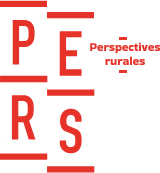At the heart of the scientific initiative led by members of the ERPS network, there is a common goal: the updating of planning and design knowledge and teaching practices in rural territories, taking account of the spatial and societal transformations which have had such an impact on the urbanisation process over the last thirty years, not only in France but across the majority of European countries.
Achieving this goal has led us into critical work on the dominant schools of thought governing the teaching and practice of planning and design, leading us to adopt the following positions and courses of action:
– to take a transformative approach to rural space at territorial level, viewing its processes as complementary to the city and urban issues;
– to bring to architectural, territorial and landscape planning and design the cross-disciplinary knowledge needed to elucidate the complexities of the state of contemporary rurality;
– to acknowledge the diverse issues surrounding agro-ecological, energy-related, social and economic transitions, as a prerequisite to carrying out spatial planning;
– to work constructively with local players and to optimise grassroots-level work through “extramural” and cross-disciplinary teaching workshops;
– to promote the social role of working architects and the emergence of new forms of professional practice;
– to generate knowledge from “project-based research”;
– to create a PhD-level educational initiative by setting up a decentralised, inter-institutional teaching platform.



